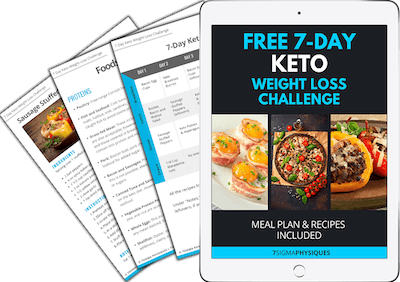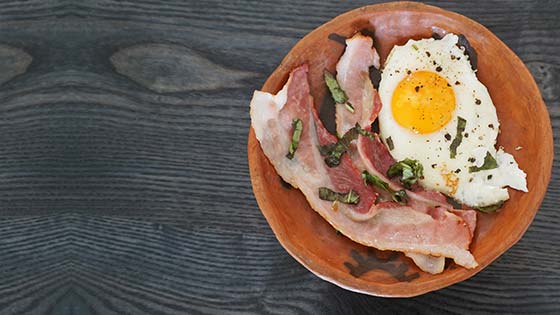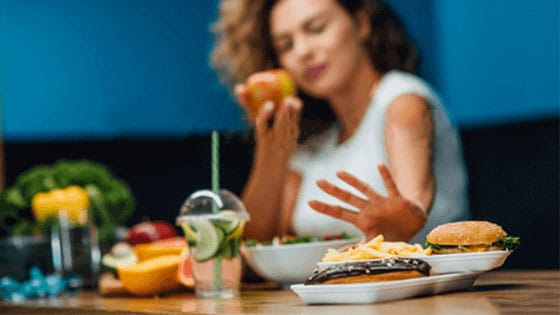The keto diet is a high-fat, low-carb, and moderate protein diet that provides several health benefits including fat loss.
Studies (1, 2, 3) suggest that the keto diet may help fight type 2 diabetes, cancer, Alzheimer’s disease, and epilepsy.
Several (4, 5, 6) studies show promising results when it comes to weight loss.
In this article, we’ll go over the keto diet for beginners.
Table of Contents
- What Is the Keto Diet?
- Keto Diet Potential Benefits
- The Keto Diet and Weight Loss
- Keto Diet Benefits on Type 2 Diabetes
- What to Eat on Keto
- What Foods to Avoid on Keto
- Keto-Friendly Snacks
- Staying on Keto While Eating Out
- Keto Supplements
- Keto Side Effects and What To Do About Them
- Frequently Asked Questions About Keto (FAQ)
What Is the Keto Diet?
Keto diet is short for “ketogenic diet.”
This diet is a high-fat, low-carb, moderate-protein diet that makes your body use fat as its main energy source instead of carbs.
When you eat carbs, such as rice, bread, and pasta, your body turns them into glucose to use for energy.
When you drastically reduce your carbs and increase your fat intake, your body has no choice but to start producing ketones and eventually enter a state of ketosis.
During this state, your body becomes more efficient at burning fat for energy. (7)
Many people use the benefits of ketosis to help lower blood sugar and insulin levels, as well as reduce cravings, improve cholesterol, and lose weight. (8, 9, 10)
You can explore these 8 tips to get into ketosis fast.
TAKEAWAY
The keto diet is a low-carb, high-fat diet that forces your body to burn fat for energy instead of carbs.
Keto Diet Potential Benefits
- Reduced appetite: Fats and protein are the most satiating nutrients, this means that they’ll keep you full for longer, which can prevent overeating and ultimately, weight gain.
- Reduced inflammation: When you’re in ketosis, your body produces ketone BHB (beta-hydroxybutyrate), which has been proven to help with oxidative stress. (11)
- Improved mental clarity: Eating more healthy fats high in omega-3s can improve your brain and cognitive health. (12)
- Improved insulin sensitivity: Reducing carbs helps lower blood sugar levels.
- Cancer: The keto diet is being used to slow tumor growth and treat some types of cancer. (13, 14)
- Alzheimer’s disease: Studies (15, 16) have shown that the keto diet might help reduce Alzheimer’s symptoms and slow its progression.
- Acne: Eating less sugary and processed foods can help improve acne. (17)
- Epilepsy: Studies (18) have found that the keto diet can drastically reduce seizures in epileptic children.
Here are another 10 unexpected benefits of the keto diet.
Lose your first 5-10 pounds in just 1 week.
Get the FREE 7-Day Keto Challenge!

The Keto Diet and Weight Loss
Some studies (19, 20) have shown that the keto diet yields better weight loss results when compared to typical low-fat diets.
This study (21) found that people on a keto diet lost about 2.2 times more weight than those on a low-fat diet. However, both diets were good at reducing HDL cholesterol and triglyceride levels.
In this other study (22), subjects on the keto diet lost about 3 times more weight than those on the recommended diet by Diabetes UK.
Studies (23) have even shown that the diet is so filling that you can lose weight without counting calories.
Here’s a more in-depth article on how the ketogenic diet promotes weight loss.
Curious about how long it takes to see results on keto? You can check out this article.
TAKEAWAY
The keto diet has been shown to be more effective for fat loss than typical low-fat diets.
Keto Diet Benefits on Type 2 Diabetes
Type 2 diabetes is a disease that happens when your blood sugar levels are too high.
Losing weight, whether it is with the keto or a different diet, will help with type 2 diabetes and pre-diabetes.
However, this study (24) showed that the keto diet improved insulin sensitivity by 75%.
In this other study (25), subjects on the keto diet lost around 25 pounds while those on a high-carb group only lost 15 pounds.
Not only did they lose more weight, but they were also able to reduce or completely stop diabetes medication.
This other study (26) found that 33% of the people in the study were able to completely stop using their diabetes medications.
TAKEAWAY
The keto diet provides incredible benefits to those with type 2 diabetes. Some have even been able to completely stop taking diabetes medications.
What to Eat on Keto
The keto diet consists of eating about 75% of your daily calories from fats, 20% from protein, and about 5% from carbs.
These numbers might look different for you, as we all react differently and have different nutritional requirements, but most people should be okay with something along those lines.
Here are some foods you can eat on keto:
- Avocados: yes, because what’s life without avocados, right?
- Cheese: Look for unprocessed cheese, such as cheddar, cream, blue, goat, and mozzarella.
- Meat: Red meat, bacon, ham, steak, sausage, turkey, and chicken are great options.
- Fish: Fish is also great on keto, especially fatty fish like salmon and seabass.
- Healthy oils: You can go for extra virgin olive oil, avocado oil, and coconut oil.
- Nuts and seeds: Almonds, walnuts, pumping seeds, flax seeds, and chia seeds.
- Whole eggs
- Butter
- Condiments: Because eating keto doesn’t mean your food can’t be tasty. You can use salt, pepper, and other herbs and spices. Just make sure to read the nutritional label before purchasing as some condiments can have sugars and hidden carbs.
- Low-carb vegetables: Cauliflower, cabbage, broccoli, asparagus, spinach, etc.
TAKEAWAY
Your focus should be on nutrient-dense foods high in protein and healthy fats.
What Foods to Avoid on Keto
Most foods you should avoid or limit during keto are high in carbohydrates. Here’s a few of them:
- Sugary foods: Think sodas, fruit juices, smoothies, baked goods, candies, etc.
- Fruits: Aim for only small servings of any kind of berries.
- Low-fat products: Low-fat products tend to have some carbs in them.
- Beans and legumes: Kidney beans, black beans, peas, lentils, etc.
- Root vegetables: Any type of potato, carrots, parsnips, etc.
- Unhealthy fats: mayo, processed vegetable oils, etc.
- Grains and starches: Rice, pasta, oatmeal, cereals, wheat-based products, bread, etc.
- Sugar-free foods: Sugar-free foods tend to have lots of sugar alcohols, which can affect your ketone levels.
- Alcohol: Drinking alcohol can prevent you from getting into ketosis or kick you out of it.
- Sauces and some condiments: They can have some unhealthy fats and sugar.
TAKEAWAY
During the keto diet, you want to avoid eating foods high in carbohydrates.
Keto-Friendly Snacks
If you’re one of those people who needs to have a little snack in between meals, here are some keto-friendly ones:
- Vegetable sticks with dip: Celery, cucumber, peppers, and carrots with cream cheese, or keto blue-cheese dressing.
- 70% or higher cocoa chocolate: Keep it small and avoid regular dark chocolate and milk chocolate as they tend to be high in carbs.
- Beef jerky: Make sure to read the nutrition label and find ones with the lowest net carbs.
- Pork rinds: These are great for when you crave something crunchy as they have zero carbs.
- Berries and cream: Again, be careful when eating berries.
- Hard-boiled eggs
- Cheese with olives
- Nuts and seeds
- Celery with guacamole
- Cheese
You could also make some delicious shakes with keto-friendly protein powders.
TAKEAWAY
When eating snacks, try going for low-carb, high-fat, moderate-protein ones.
Staying on Keto While Eating Out
Keto beginners often worry about what they will eat when they go out, however, it’s not actually difficult to stay on keto while doing so.
Here are some useful tips to stay on keto while eating out:
- Ask to swap the starch on your entree for some extra veggies or salad.
- Most restaurants will gladly swap the bun on your burger for lettuce.
- Opt for meat or fish-based entrees.
- Avoid entrees with too many ingredients, such as sauces as they often contain lots of sugar and carbs.
- Ask for extra butter and let it melt on your veggies or meat.
- Ask for olive oil and vinegar to add to your salad instead of creamy dressings.
- If you know where you’re going to eat, google their menu beforehand to see which foods they have that are keto-friendly.
TAKEAWAY
There are plenty of easy ways to eat keto while dining out.
Keto Supplements
While keto supplements are not necessary, they can make things a little easier for some, especially beginners.
Here are some often used keto supplements:
- MCT oil. This type of oil is digested faster than other fats and can help you reach your daily fat intake.
- Digestive enzymes. Eating lots of fats and not enough fiber can cause some digestive issues, therefore, people on keto can benefit from digestive enzyme supplements to better digest fats.
- Keto protein powders. Most protein powders contain a few added carbs. Keto protein powders, on the other hand, contain almost no carbs.
- Exogenous ketones. This supplement helps increase your body’s ketone levels and reach ketosis faster. (27)
- Keto electrolytes. Because of the water loss at the beginning of keto, it’s not uncommon to deplete your body from electrolytes. Electrolyte supplements can help prevent deficiency of sodium, magnesium, and potassium. (28)
TAKEAWAY
Keto supplements can make the diet and weight loss a bit easier, however, they’re not necessary.
Keto Side Effects and What To Do About Them
Even though the keto diet is safe for most people, there might be a few side effects to look out for.
Here are some keto side effects beginners might experience and what to do about them:
- Keto Flu
The keto flu is a temporary and normal reaction that happens to your body when switching energy sources from carbs to fat.
The keto flu typically happens between 24-48 hours after starting keto.
Some symptoms you might experience are brain fog, insomnia, headache, sugar cravings, muscle soreness, and irritability.
This affects mostly beginners who had a high-sugar diet before starting keto.
To reduce the symptoms of the keto flu, you can go low-carb for a few weeks before starting keto and completely eliminating carbs.
The keto diet can also cause your body to deplete from electrolytes, so adding some extra salt to your meals or taking keto electrolyte supplements can help.
- Digestive Issues
Due to its low-carb nature, it might be difficult for some people to not get enough fiber when eating keto.
This can lead to constipation and irritable bowel syndrome. (29, 30)
To prevent digestive issues and stay in ketosis, make sure that the few carbs you eat come from low-carb, leafy veggies.
You may also want to make sure you’re getting enough magnesium, potassium, and sodium and staying hydrated.
- Diarrhea
The keto diet can cause either constipation or diarrhea. If you’re experiencing diarrhea, it might be because your body isn’t used to eating that much fat.
To prevent this, consider taking it easy with MCT oils or adding some digestive enzymes to your diet as these can help your body break down and better digest fats.
TAKEAWAY
Most keto side effects experienced by beginners are normal and should go away in a few days.
Frequently Asked Questions About Keto (FAQ)
1. How Do I Know if I’m in Ketosis?
Reaching a state of ketosis typically takes about 2-3 days, however, it might take a few weeks for others depending on how easily your body adapts to using fat for energy.
A few telltale signs that you’re on keto include:
- Keto breath: You might experience a weird metallic taste in your mouth due to increased levels of ketones.
- Rapid weight loss: If you experience rapid weight loss (mostly water weight) within the first week of starting keto, that means your body is getting rid of your stored carbs.
- Better focus
- Flu-like symptoms: When first starting out, you might experience flu-like symptoms, such as chills, lightheadedness, and headaches.
Other ways to find out if you’re in ketosis is to test your ketone levels with urine strips or blood meter.
When measuring your blood ketone levels, they should be 0.5-3 millimoles per liter.
2. Will I Lose Muscle Mass?
Losing muscle is a common concern among keto beginners, however, this doesn’t necessarily happen during keto.
In order to prevent muscle loss, you need to make sure to reach your daily protein intake as well as add some resistance training, such as weight lifting, to your routine.
While protein is crucial for muscle support, muscle itself won’t build without some form of resistance training.
Here’s how it works:
After weight training, your body repairs the damaged muscle fibers through a process where it fuses fibers together to form new ones.
These newly repaired fiber increase in thickness. Without this process of breaking and rebuilding, muscle growth or maintenance won’t happen.
3. Can I Build Muscle on the Keto Diet?
Just like I mentioned above, resistance training and proper protein intake will be important for building muscle.
While you can build muscle on keto, it is not optimal, this is because carbohydrates are your body’s preferred source of energy when it comes to high-intensity resistance training.
5. How Much Protein Can I Eat?
While too little protein can lead to muscle loss, eating too much protein can kick you out of ketosis. During the keto diet, you don’t want to go above 35% of your total daily calorie intake for protein.
6. Can I Do Dirty Keto?
While you can reach ketosis on dirty keto, I wouldn’t recommend it. That’s because dirty keto allows too many packaged, processed, and fast foods, which can lead to overeating and ultimately weight gain and elevated inflammation markers.
7. Why Am I Not Losing Weight on Keto?
- Eating too much: Just like any other diet, to lose weight on keto, you must eat fewer calories than you burn.
- Eating too little: Drastically cutting your calories can slow your metabolism even faster and stall your progress.
- Consuming too much protein: While protein is an essential nutrient, eating too much can kick you out of ketosis. 20-25% of your daily calories should come from protein.
- Eating too many carbs: Some foods you’re eating might have hidden carbs, make sure to read the actual nutritional label and not just the marketing buzzwords on the front.
- Food intolerance: You might be intolerant to a food you’re eating. The most common food allergies in the US are dairy, nuts, wheat, soy, seafood, fish, and eggs.
You can check out this list of 12 reasons why you’re not losing weight on keto if you’d like to explore more.
8. Is Ketosis Dangerous?
No, keto beginners often confuse ketosis with ketoacidosis.
Ketosis is normal, ketoacidosis, on the other hand, is when acids build up in your blood, which can happen when your blood sugar is too high for too long.
9. Are The Keto Diet and Atkins Diet The Same?
No, the Atkins Diet focuses on a large amount of protein, while the keto diet only focuses on a moderate amount. Remember, eating too much protein can kick you out of ketosis.
10. Can I Do Intermittent Fasting While on Keto?
Absolutely, intermittent fasting might actually help you reach ketosis faster.
You can read more about fasting in this article, and about the benefits intermittent fasting has on cancer and aging in this one.
11. Can I Drink Sodas During Keto?
Absolutely, however, you might have to swap sugary sodas for one of these keto soda alternatives.
Swapping sugary sodas for keto alternatives makes it easier for beginners making the transition to keto.
12. Is the Keto Diet Expensive?
Not necessarily, you can totally do keto on a budget.
Here’s an article I wrote about how to eat keto on a budget.
13. How Long Does It Take to See Results on Keto?
Although several things can affect how fast you lose weight, the average person on keto can lose about 5-15 pounds the first week.
After 12 weeks, most people are able to lose between 30-40 pounds.
However, these numbers can vary depending on the person’s lifestyle and metabolism.
14. Which Keto Program Would You Recommend for Beginners?
For beginners ready to start their keto weight loss journey, I would recommend the Custom Keto Diet plan.

This plan helps men and women lose fat without starving themselves or giving up their favorite foods.





